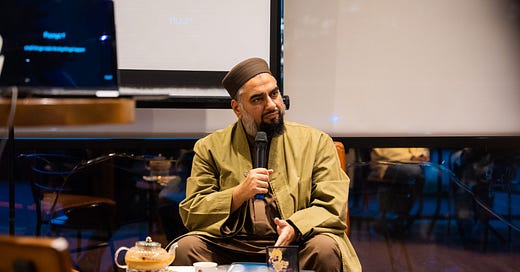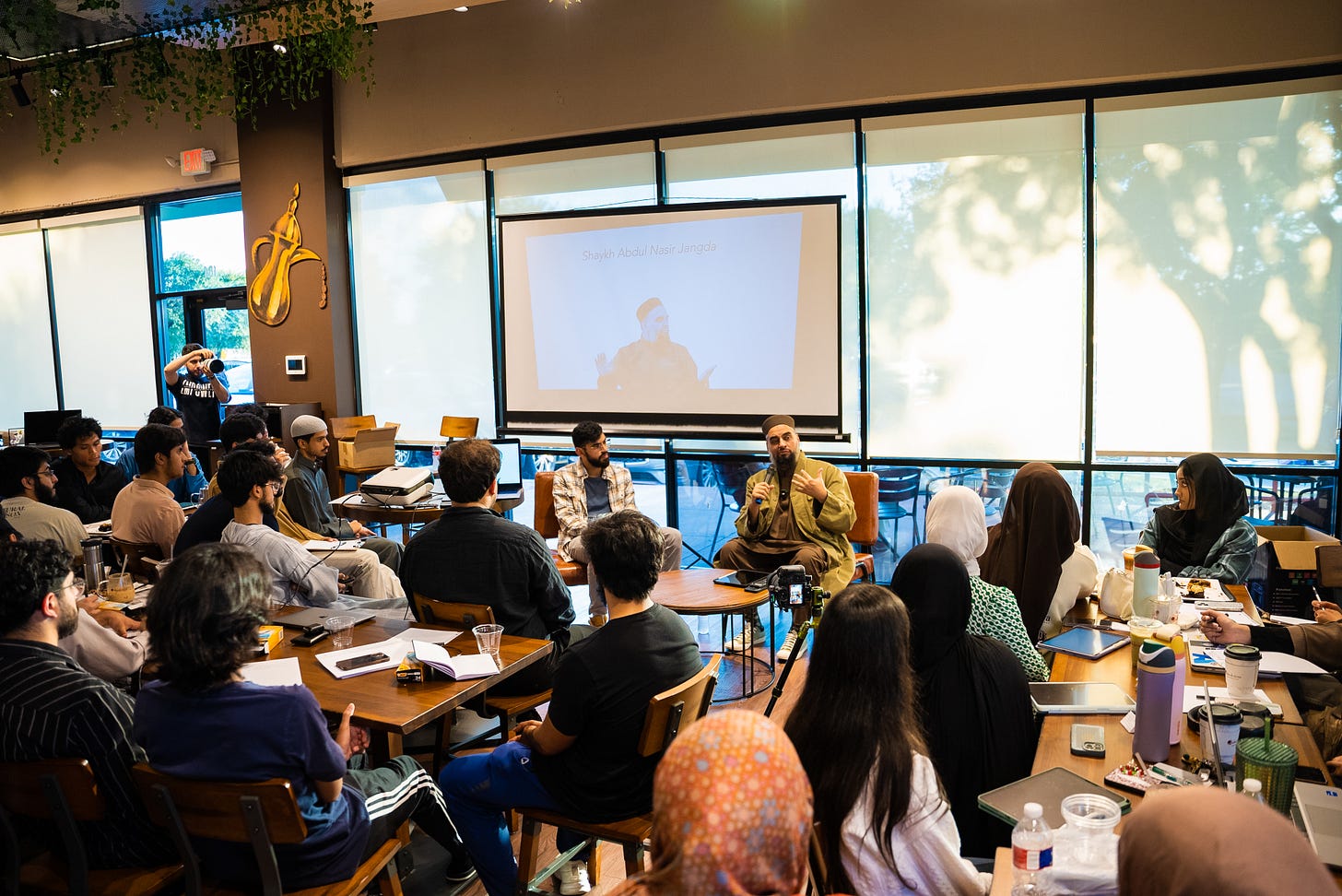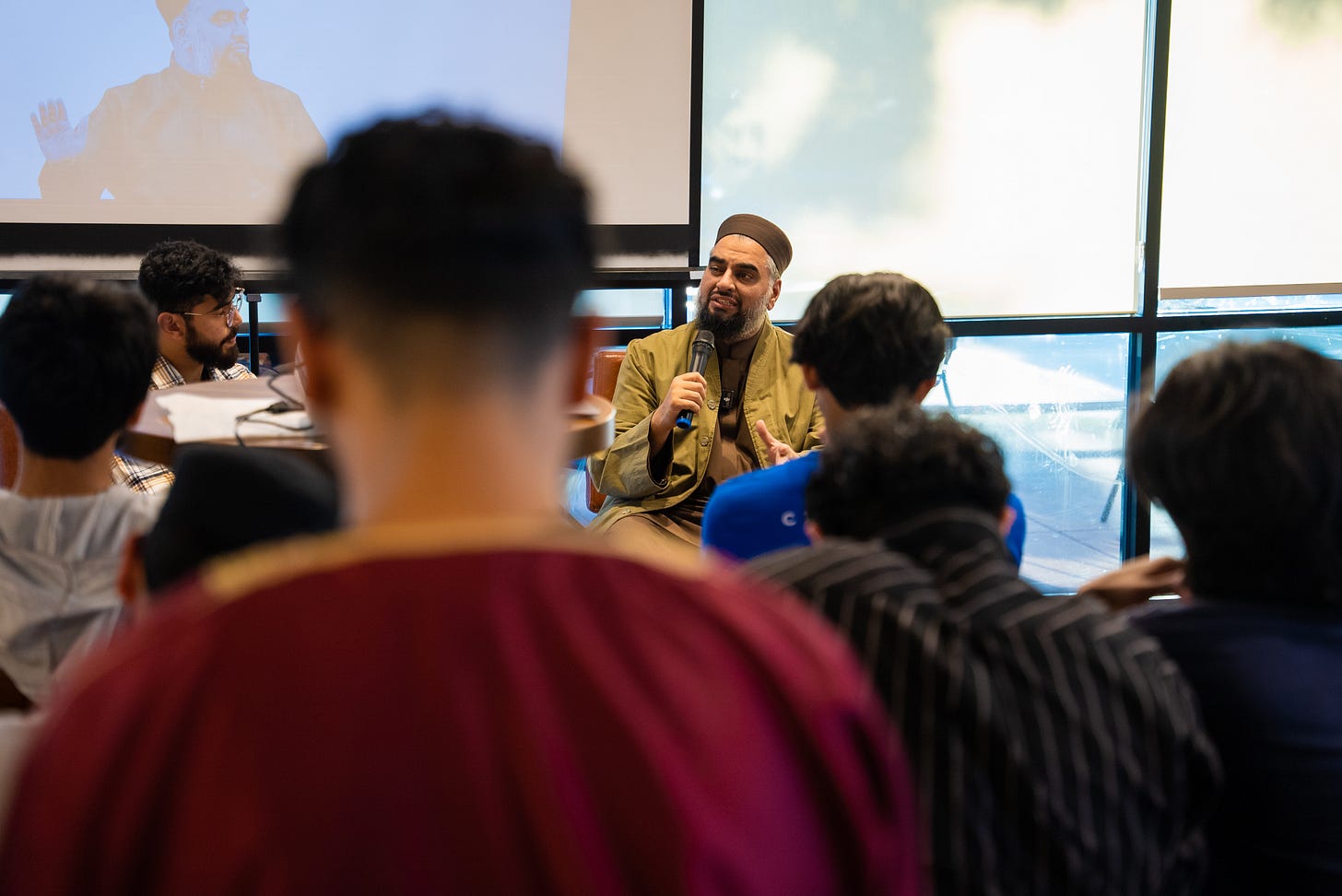Full Audio and Transcript: NUUN X Shaykh Abdul Nasir Jangda | Sep 12, 2024
Small things make the big things happen
Shaykh Abdul Nasir Jangda is the Founder and President of Qalam. He teaches at the Qalam Seminary, covering subjects such as Sahih Bukhari, advanced Tafsir, Usul, Fiqh, Aqidah, and Balaghah. He has conducted an in-depth study of the Prophet's life through the Seerah Podcast and annually leads the Qur’an Intensive and Seerah Intensive courses. He also guides groups on the Seerah Umrah tour and visits to Masjid Al-Aqsa.
He sat down with Nuun Collective last month for a talk & discussion on community building. Below is a transcript from that event.
Note: This transcript has been slightly edited for readability in written format.
Introduction
I know we're behind time, so we'll get right into it. Shaykh, you have been part of this community for such a long time, a key pillar of it, and you've seen it become the city on a hill that it is today, a city the world talks about. I want to ask you how we got here and what roles you've seen people play in making it happen.
Shaykh Abdul Nasir Jangda
It's good to be here with everyone, alhamdulillah. I'm really pleased to see everyone come out and participate and strive to understand and think a little more deeply about things. This is always an interesting topic for me and an interesting point of discussion. When I travel around the country, we have visitors coming all the time, and it’s become an interesting dynamic. I'm still not comfortable with it, but whenever people come to town, it's almost like visiting the campus is a tourist destination—it’s always on their list of places they want to stop, visit, and see. The bizarre thing is when people come to town and I ask what brings them here, they say this. When I travel around the country, people talk about Dallas, and I sometimes don't even realize what they're actually discussing.
It is quite interesting, and sometimes hard to grasp and believe, what the city has become and what it represents. With all that being said, I sometimes joke with people and tell them that I'm one of the people in Dallas who's actually from Dallas. A lot of people have moved here over the last 15 or 20 years, but I was born and raised here.
There's a very interesting observation about where we were and where we are now. The actual task is to try to connect those two dots. I can sit here and tell you where we were, what it used to look like, and I'll share some of that with you, and you obviously see where we are today. But the thing I can't provide for you is the connection between those two things—how we got here. Now, you might say, "Wait a second, that's an objective thing, that's history." It is, but at the same time, history depends on perspective.
History depends on perspective. Someone very economically focused might say, "We got here because jobs came, companies headquartered here, which brought more professionals, people, and an influx of money." Or, “The real estate market—that’s how we got here.” Someone else, more socially or educationally focused, might say, "We had a demographic that was more educated." Someone spiritually focused might say, "Someone came here a long time ago, made dua, and asked Allah to make this place flourish, and boom, that's how we got here." Everyone has their own perspective, and that’s what's fascinating.
That’s why I appreciate tonight's program. It's putting the onus on everyone here to not just sit back and listen but to think, reflect, and put pen to paper. Really jot down your thoughts—what factors do you think helped us go from point A to point B?
To talk about where we were: I can share with you some of the older students like Abdelrahman Murphy and Fatima Lette. I've driven them around and shown them where things were and how they progressed step by step. Suffice it to say, I actually remember a time when I was a child, a very long time ago, when we didn’t have a single place to pray in the entire DFW area. Every Thursday night or Friday morning, a few brothers, including my father, would get on the phone—I’m talking about old-school phones—and try to see if they could find a place where 10 or 12 people could pray. They would coordinate that, and that was their focus. I still remember actual Fridays when it didn’t happen because they couldn’t find a place.
Also, what's interesting is there weren’t many people—probably 10 or 15 Muslim families—but most of them were on the Tarrant County side, in Arlington and Fort Worth. That’s kind of where our community started, which is probably surprising to a lot of people. That was our reality. I remember when we had our first place to pray, a small house off the UT Arlington campus. That’s now a parking lot, but I remember that spot, and it became a big deal for people to drive from wherever they lived to congregate there.
I also remember the first time the community bought land. It was the Islamic Association of North Texas. We called it the Richardson Masjid. They bought the land, and it was the first piece of land the Muslim community owned. That was huge. There was a small house on the land where they prayed, but the first masjid that was built from the ground up was the Islamic Center of Denton. That’s not a joke—it sounds like a joke, but it’s not. That was the first masjid built, shoutout to Saudi Arabia. It was the mid-80s, and that’s how things worked. Some Saudi graduate students got money from their rich uncles back home, and they built it. You could tell they didn’t really know what they were doing, but it was built.
That was the beginning of our community. Even up until the early 2000s, things didn’t change drastically. When I came back after 12 years of studying overseas, we had a couple of purpose-built masjids in Arlington, Fort Worth, and Richardson, but Plano’s masjid wasn’t built yet. Irving’s masjid wasn’t built yet. They were still in office buildings and shopping centers. EPIC Masjid didn’t exist yet, and there was nothing in between. The community was very sparse, disconnected, and disjointed, way behind Houston and Austin. That was our reality.
Before I talk about the changes, let me share a specific story. In 1988, we had built just the first part of the Richardson Masjid. If you go inside now, to the innermost part, that was the entire building back then. Everything else was added later. My uncle was part of the core team that built that.
Now that we had our own masjid, it was exciting, but we didn’t have spiritual leadership. We didn’t have a scholar or an imam. We didn’t even have someone to lead us in salah. My uncle went to Pakistan, to Karachi, where we're from, and he visited an Islamic university. There, he met the head of the institution, Shaykh Muhammad Naim, who would later become my teacher, shaykh, and mentor. My uncle told him about our fledgling community in Texas and asked him to come help us. The shaykh eventually agreed and came to spend the last ten nights of Ramadan with us in 1989.
Shaykh Naim was a world-class scholar, running an institution with thousands of students, producing hundreds of huffaz and dozens of scholars every year. He put all of that on hold and came to Dallas, stayed in the masjid, and did itikaf with us. This was such a big deal that the 20 or 30 families in the community put their lives on hold. Kids didn’t go to school, adults didn’t go to work if they could afford it, and we were all in.
We had a routine. We'd gather before Maghrib, make duas, break our fast, pray Maghrib, eat, get ready for Isha, and he would lead us in salah. After Taraweeh, he’d give lectures, and we’d have tea and prayers. Then, he'd answer questions for an hour or two. After more prayers and dhikr, we'd pray Fajr together, go home, sleep, and repeat the whole routine for ten days.
I still remember that experience—it was remarkable. At the end of it, the last night, he told us, “You’re never going back home. This is home.” Some brothers got upset because the mentality back then was that this was temporary. But he insisted, “This is home. You have to think about the future and build for it.” His main emphasis was investing in people, particularly through knowledge and scholarship. He said we’d need people to lead the community going forward.
That night, I heard him, and I’d already been obsessed with trying to memorize the Qur'an. I told my dad, “I want to go study,” and he said, “Great, but who's going to tell your mom?” Eventually, we decided that the shaykh would tell her. We took him to our apartment, and I still remember the last time I met him in person, which was about six months before he passed away, right before the lockdown began.
As I close, I want to emphasize this: What motivated a world-class scholar, a teacher of teachers, running an institution ten times the size of anything here? He was already doing it. He didn't come here to start something; he was already doing it. But what motivated him to leave, put it all on hold, and come here to spend time with 40-50 of us, the twenty families or so, every night in some remote corner of the world?
Because he understood: Doing big things requires taking small steps. The Prophet ﷺ said never to underestimate any good you can do. But he had a vision, a maqsad, a purpose. He was willing to sacrifice, to do hard, difficult things, to plant seeds, even if he’d never sit under the shade of the tree they’d become.
He never saw the new Qalam campus. He never did. I studied under him; he mentored me, taught me; he was everything to me for 32 years of my life. Qalam is a direct fruit of his tree. If you ever go to Southern California, there's a huge, beautiful institution called the Institute of Knowledge. The founder, the director, Shaykh Nomaan Baig, was our mentor. There’s a Darul Uloom in New York, started by someone from his institution. Even the founders of Miftaah studied at Binoria, and he was their mentor too.
So now you see all these gardens, but they were the seeds he planted more than 30 years ago. That's why it's important to do the work and to be willing to sacrifice.
I wanted to mention, we discussed a couple of weeks ago Imam Yusuf Kavakçı, who spent 20+ years with us in Dallas. He was a scholar in his own right, trained in the Ottoman system and the Western academic system. He was a remarkable scholar, and Turkey recruited him back because they knew his worth. But he invested over two decades here in a community that, frankly, didn’t appreciate him. Why? Because he understood: You’ve got to do the hard work and sacrifice.
That's what God said1 to the Prophet ﷺ. Be steadfast in what you have been told to do.
Surah Hud, Verse 112. https://quran.com/11/112.






